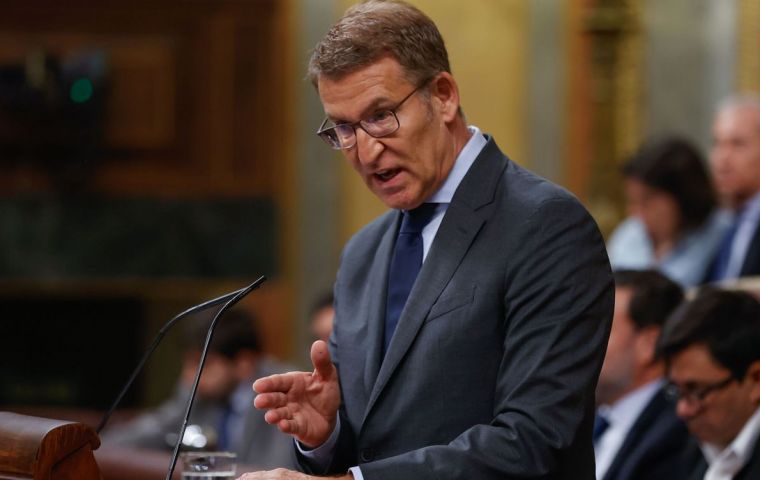MercoPress. South Atlantic News Agency
Spain unable to form a new ruling coalition: regional separatist parties are kingmakers
 Feijoo conservatives received most votes in the election but have been unable to form a government since they do not accepts separatist parties conditions
Feijoo conservatives received most votes in the election but have been unable to form a government since they do not accepts separatist parties conditions Spanish Popular Party leader Alberto Nunez Feijoo fell short of the 176 votes he needed to become prime minister after a vote by lawmakers on Wednesday. Feijioo's conservative Popular Party won the most seats in the July 2023 general election, but he has struggled with putting together a coalition to form a government as he opposes giving concessions to separatist parties.
Feijoo failed to convince enough lawmakers to back him to win an absolute majority after several hours of debate that began Tuesday, before the first round of voting on Wednesday.
“Nobody knows what is going to happen in this country if my bid to become prime minister fails,” Feijoo told lawmakers.
”Therefore it seems reasonable, given that we are in a democracy, that the (current) government not hide its deals. But they don’t even want to talk about them. Transparency and this government are incompatible,“ Feijoo added.
Feijoo had 172 votes in his favor to 178 against in the 350-seat parliament. Feijoo will get a second vote on Friday, though TV station
RTVE reported his was an ”impossible candidacy” and he stood little chance of being chosen by lawmakers to lead the country.
The Popular Party holds 137 seats. It has the backing of the far-right Vox's 33 lawmakers and two from smaller conservative parties representing Navarra and the Canary Islands.
Feijoo's path to power has been complicated by his party's alliance with Vox, which denies climate change and rails against feminism. Vox wants to maintain territorial integrity and recentralize power in the face of growing separatist movements.
If he fails to win votes on Friday, acting Prime Minister Pedro Sanchez would get a shot at staying in office. To do so, he would need the support of the country's regionalist political parties to add to the 121 seats the PSOE won.
Chief among the regional parties is the party led by exiled former Catalan President Carles Puigdemont, as the party holds seven seats.
Puigdemont, who is wanted in Spain for attempting the region's secession in 2017, has demanded that legal action be dropped against fellow separatists as a condition for his support.
The debate before the vote was also dominated by the possibility that Sanchez was considering accepting the demand of Catalan separatist parties.
The Galician leader Feijoo had claimed on Tuesday that he was close to becoming prime minister, but that he was not willing to pay the political price of an amnesty that the Catalan separatists wanted.
If no government is formed before November 27, the parliament will be dissolved. A new election would be called in January.




Top Comments
Disclaimer & comment rulesCommenting for this story is now closed.
If you have a Facebook account, become a fan and comment on our Facebook Page!